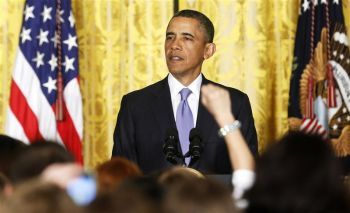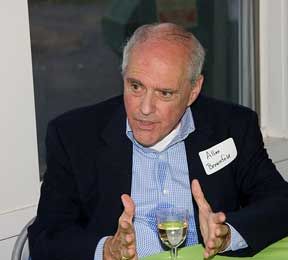
Publisher:
Bonnie King
CONTACT:
Newsroom@Salem-news.com
Advertising:
Adsales@Salem-news.com

~Truth~
~Justice~
~Peace~
TJP
Nov-14-2013 19:58

 TweetFollow @OregonNews
TweetFollow @OregonNews
Government's Recent Performance Bolsters Skepticism About Its Role In Society
Allan Brownfeld Salem-News.comIn mid-November, a Quinnipiac University poll showed Obama with the lowest approval rating of his presidency.
 |
(WASHINGTON, DC) - Government's performance in recent days has been dismal. This is hardly new. One of the reasons for President Obama's election, after all, was dismay with President George W. Bush's eight years in office. During that period we went to war in Iraq because of weapons of mass destruction which turned out not to exist, taxpayers bailed out failing banks on Wall Street, Medicare was expanded with an unfunded drug benefit and government deficits reached all-time highs. Things, we were told, couldn't get worse.
Somehow, the current administration seems to be doing its best to show that things can continue on a dangerous downhill spiral. The Affordable Care Act, hailed as President Obama's landmark achievement, is in a shambles. Not only does its website not work, but promises made by the president that Americans would be able to keep their policies, have been shown to be untrue.
In mid-November, a Quinnipiac University poll showed Obama with the lowest approval rating of his presidency. Only 39 per cent approved of his performance. Fifty four per cent disapproved. These numbers are similar to those of a Pew survey that showed the president's job approval at 41 per cent with 53 per cent disapproving.
Public disillusionment with government goes far beyond health care. We now know that the surveillance program of the National Security Agency appears to be out of control. Even liberal defenders of the administration find it difficult not to express their criticism. WASHINGTON POST columnist Eugene Robinson, for example, wrote of "...the NSA's apparent goal of knowing everything. The agency collects information as massively and indiscriminately as possible on the theory that if you assemble a database of all the world's communications, the few you seek---those involving terrorists---will be in there somewhere.. This is... a massive invasion of privacy... While NSA analysts were sifting billions of phone records, they were unaware that one of their own contract analysts, some guy named Snowden, was about to spill all the precious beans..."
It seems that almost every day we learn of some government program which is not working---or has gone awry. In mid-November---to cite one recent report---a federal revue concluded that there is no evidence that airport checkpoint personnel have any basis for judgment when they scan a line for suspicious passengers. In a report to a House subcommittee, the Government Accountability Office says there is no evidence it's effective for Transportation Security Administration officials to scan crowds for signs someone might be a terrorist. The GAO report recommends that Congress stop funding for the program---which has cost $878 million thus far.
In recent years, many Americans have forgotten the Founding Fathers' view that power is a corrupting force. In The Federalist Papers, James Madison declared: "It may be a reflection of human nature that such devices should be necessary to control the abuses of government. If men were angels, no government would be necessary. In framing a government which is to be administered by men over men, the great difficulty lies in this: you must first enable the government to control the governed, and in the next place oblige it to control itself."
The deliberations of those who created the American Republic are instructive. Among the works carefully studied by the founders was Polybius' historical analysis of Roman character and the Roman Constitution, written about the middle of the 2nd century B.C. That system incorporated both checks and balances upon political power and provided for separation of political functions. The Roman constitution, said Polybius, was not formed upon abstractions but developed out of the circumstances of the time of troubles in which the people of Rome found themselves.
This was the "mixed government" praised by Aristotle, but which Aristotle had thought almost impossible to maintain on a grand scale. The Roman experience, writes Russell Kirk in "The Roots Of American Order," was "mentioned repeatedly in the constitutional debates in Philadelphia. The consequences of Roman centralization had their part in discouraging schemes for a central, rather than a federal government in America----quite as the Greek disunity had a part in the arguments against a mere loose confederation...And in the 18th century climate of rationalism, American knowledge of the effects of Rome's religious and ethical decline upon the social order did something to secure American attachment to the free exercise of religion...Rome's example of decadence was a cautionary lesson...But also Rome's legacy of law was part of the American inheritance."
A more direct influence upon the founders was the history of England and, in turn, their own history of self-government in the colonies. The Common Law, which evolved over centuries, was, Kirk points out, "the foundation of order...also it was the foundation of freedom. The high claim of the commentators on the common law was this: no man, not even the king, was above or beyond the law."
Activist government---involved in every aspect of people's lives---was the opposite of what the Founding Fathers had in mind. At the beginning of his Administration, Thomas Jefferson wrote a friend that "the path we have to pursue is so quiet that we have nothing scarcely to propose to our Legislature. A noiseless course, not meddling with the affairs of others, unattractive of notice, is a mark that society is going on in happiness."
In recent years, whether those in power were Republicans or Democrats, liberals or conservatives, the power of government has increased, as has the percentage of the gross national product disposed of by the state. The deficit has skyrocketed. Those out of power often speak of cutting government. Once in office, however, they do precisely the opposite. Both of our political parties are far removed from the fear and suspicion of power which the Founding Fathers shared.
Shortly before his death, Russell Kirk, whose book "The Conservstive Mind" was one of the most influential of our time, noted that, "As an instrument of order, the Constitution would be more successful than any other written device in the history of mankind." He warned, however, that, "One of the more pressing perils of our time is that people may be cut off from their roots in culture and community...Moral and social order, or a vast part of it, may be destroyed by a few years of violence or a few decades of contemptuous neglect. Then hope is lost for many generations; for order is a kind of organic growth, developing slowly over many centuries."
Today's Washington would be no surprise to the Founding Fathers. Human nature being what it is, they expected it. The only thing that might surprise them is the faith that some Americans still place in government power. Now that skepticism is growing,the Framers may feel that freedom is a bit more secure. Skepticism of power, after all, is something they made sure to bequeath to future generations of Americans.

Salem-News.com contributor Allan C. Brownfeld received his B.A. degree from the College of William and Mary, his J.D. degree from the Marshall-Wythe School of Law of the College of William and Mary and his M.A. in Government and Politics from the University of Maryland. He has served on the faculties of St. Stephen's Episcopal School, Alexandria, Virginia, and the University College of the University of Maryland.
The recipient of a Wall Street Journal Foundation Award, Mr. Brownfeld has written for such newspapers as THE HOUSTON PRESS, THE RICHMOND TIMES DISPATCH, THE WASHINGTON EVENING STAR and THE CINCINNATI ENQUIRER. For many years he wrote three columns a week for such newspapers as THE PHOENIX GAZETTE, THE MANCHESTER UNION LEADER, and THE ORANGE COUNTY REGISTER. His weekly column appeared for more than a decade in ROLL CALL, the newspaper of Capitol Hill. His articles have appeared in such journals as THE YALE REVIEW, THE TEXAS QUARTERLY, THE NORTH AMERICAN REVIEW, ORBIS and MODERN AGE.
Mr. Brownfeld served as a member of the staff of the U.S. Senate Internal Security Subcommittee and was the author of that committee's 250-page study of the New Left. He has also served as Assistant to the Research Director of the House Republican Conference and as a consultant to such members of Congress as Reps. Phil Crane (R-Il) and Jack Kemp (R-NY) and to the Vice President of the United States.
He is a former editor of THE NEW GUARD and PRIVATE PRACTICE, the journal of the Congress of County Medical Societies and has served as a Contributing Editor AMERICA'S FUTURE and HUMAN EVENTS. He served as Washington correspondent for the London-based publications, JANE'S ISLAMIC AFFAIRS ANALYST and JANE'S TERRORISM REPORT. His articles regularly appear in newspapers and magazines in England, South Africa, Sweden, the Netherlands and other countries. You can write to Allan at abrownfeld@gmail.com
 |
 |
 |
Articles for November 13, 2013 | Articles for November 14, 2013 | Articles for November 15, 2013
Quick Links
DINING
Willamette UniversityGoudy Commons Cafe
Dine on the Queen
Willamette Queen Sternwheeler
MUST SEE SALEM
Oregon Capitol ToursCapitol History Gateway
Willamette River Ride
Willamette Queen Sternwheeler
Historic Home Tours:
Deepwood Museum
The Bush House
Gaiety Hollow Garden
AUCTIONS - APPRAISALS
Auction Masters & AppraisalsCONSTRUCTION SERVICES
Roofing and ContractingSheridan, Ore.
ONLINE SHOPPING
Special Occasion DressesAdvertise with Salem-News
Contact:AdSales@Salem-News.com

googlec507860f6901db00.html



Terms of Service | Privacy Policy
All comments and messages are approved by people and self promotional links or unacceptable comments are denied.
[Return to Top]
©2025 Salem-News.com. All opinions expressed in this article are those of the author and do not necessarily reflect those of Salem-News.com.